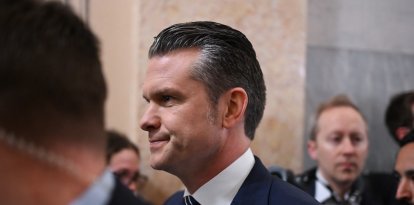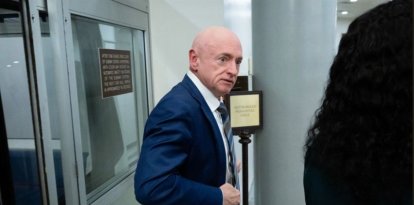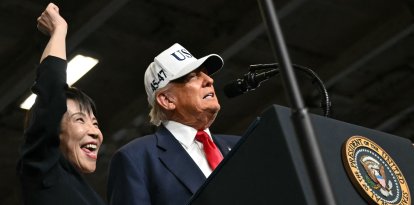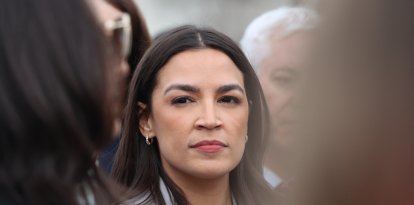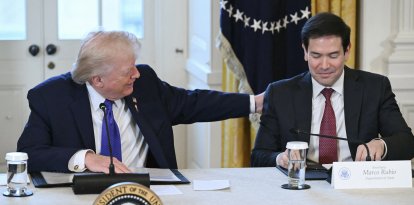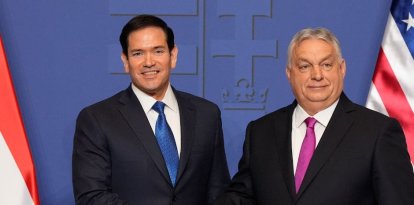Donald Trump, the man who killed three political dynasties
Bush, Cheney and Clinton: three sagas that the New York magnate man passed over.

(Cordon Press)
On March 4, 1825, John Quincy Adams was sworn in as President of the United States. It would be the first time that the name be repeated in the presidency but not the last. Dynasties, in national as well as state and local politics, have been a fact of life ever since the Constitution was adopted and even to present day. One man alone, Donald Trump, Jr., appears to have been able to end three political dynasties: The Clintons, the Bush’s and the Cheney’s. Even so, the tradition remains, but is weakened.
Cheney
Liz Cheney (RINO-WY) ran in the Republican primary for Wyoming and lost by to Donald Trump’s sponsored candidate, Harriet Hageman. It was a humiliating defeat for Trump's main rival within the Grand Old Party, and it was a hard blow for the NeverTrumpers, but it was also the end of the Cheney dynasty.
Liz's father, Richard (Dick) Bruce Cheney, began working as an intern for Congressman William A. Steiger in 1969 and has been involved in politics at the highest level ever since. He then served as director of the Cost of Living Council, assistant to President Ford in 1974 and 1975, and finally as chief of staff, replacing Donald Rumsfeld.
In the 1978 election he was elected as representative for Wyoming, a seat he held until 1989. Under George H. W. Bush, he became Secretary of Defense (1989-1993), which meant he had to live through the historic collapse of communism and Saddam Hussein’s invasion of Kuwait. He served with George W. Bush as vice president for eight years. His daughter Liz joined politics in 1989, and has held the same House seat, Wyoming, since the 2016 election.
The long Bush dynasty
If we have mentioned the two Bush’s, it is because both father and son have held the office of the presidency. However, in the case of this dynasty we have to go way back. Captain Timothy Bush, Sr. (1735-1815) participated in the American Revolution. When the Constitution was ratified, he was 53 years old. Surely he did not think that his offspring would go so far in politics in his home country. His grandson Odadiah (1797-1851) was a businessman and anti-slavery activist. He died while returning to New York after making a fortune off of Californian gold.
His son James (1825-1889) began the family tradition of studying at Yale. James had four children, one of whom was Samuel Prescott Bush (1863-1948) who became a real tycoon, at the hands of Frank Rockefeller and Edward Henry Harriman. The two families were part of the economic aristocracy before World War II. Samuel Prescott was chairman of Herbert Hoover's Committee for Unemployment Relief.
Of his five children, the most prominent was Prescott Sheldon Bush (1895-1972), who was a senator from Connecticut for ten years. Prescott was a proponent of eugenics and population control, and was the treasurer of Planned Parenthood's first fundraising campaign. The two George's, his son and grandson, would become presidents of the United States.
Trump vs. Bush and Clinton
Jeb Bush, son and brother of the two presidents and former governor of Florida, aspired to everything. The Bush name might have prevailed for a third time on the list of U.S. presidents if it hadn’t been for Donald Trump, who ultimately won the Republican nomination for president in 2016.
Trump's ability to impose himself on this dynasty does not end there. On May 24, his candidate Ken Paxton beat George Prescott Bush, Jeb's son, in the Republican primary to be the candidate for Texas attorney general. His defeat was not minor: 68-32%.
Donald Trump's ability to kill dynasties does not end here because in 2016 he defeated the powerful Hillary Clinton. If Hillary had won the election, the succession of names in the presidency would have been Bush-Clinton-Bush-Clinton. However, that was not the case due to Trump's victory.
Political dynasties, an American tradition
The Adams case is only the first in a tradition of political dynasties. The Harrison name is not as well known as others, but it has produced two presidents. William Henry Harrison won the 1828 election. On March 24, 1829 he took office but became seriously ill. He died on April 4. He was said to be the best president in history, since he is the one who has done the least damage. His father, Benjamin Harrison, was one of the founding fathers. His grandson, also named Benjamin Harrison, was president from 1889 to 1893. He is the only one to have succeeded and passed down the presidency to the same person: Grover Cleveland.
One of the most famous sagas is that of the Kennedys. John F. Kennedy was the 35th president of the United States. His father, among other positions, was the U.S. Ambassador to Great Britain from 1938 to 1940. His brother Bob was a U.S. Senator and Attorney General, and Edward was a U.S. Senator from Massachusetts from 1962 to 2009. Among the next generation, Joseph P. Kennedy III has been a member of the House of Representatives since 2013. The Roosevelts have provided the country with two presidents, although they were distant cousins to each other. Romney, Taft, Udals, Cuomos, Lodge... The list goes on and on.
The phenomenon may be coming to an end. John Zogby, a Democratic Democrat, believes that "With Liz Cheney leaving office, it looks like the end of the notion of a D.C. elite. I don't see any other family on the horizon. Both a fulfillment of our culture and a revolution away from inside-the-Beltway dominance.”John McLaughlin, a Republican sociologist, makes a historical analogy along the same lines:














